Читать книгу Aging - Harry R. Moody - Страница 42
На сайте Литреса книга снята с продажи.
Controversy 1 Does Old Age Have Meaning? The Meaning of Age
ОглавлениеMost of the characteristic qualities we associate with old age are uniquely human. For instance, among animal species in the wild, we never see offspring take care of the aging parents who gave birth to them. On the contrary, young animals typically leave their parents when they themselves reach maturity, like baby birds that leave the nest to fly on their own. It is only human beings who care for and honor the oldest members of the species, just as only human beings care for and remember their dead. In both cases, we might ask: Why?
The answer is that human beings live in a symbolic world of shared meaning, and the power of meaning can be a matter of life and death. For example, acts of bravery in crisis or wartime prove that people are willing to sacrifice their lives for what outlives the individual self—whether they act on behalf of family, religion, patriotism, or something else. Outliving the self—what Erik Erikson called generativity—is not limited to acts of sacrifice (Kotre, 1984). Awareness of a meaning that transcends individual life is a universal human quality. Transcendence and the search for meaning are what make us human (Frankl, 2006).
Human beings contemplate aging and death, and they reach backward and forward in time to pose questions about the meaning of existence. In remembering the dead and in caring for the aged, we express our deepest convictions about the meaning of life. Old age is a time when we are likely to come face-to-face with questions about the ultimate meaning of being human. While there have always been some members of any given population that are the oldest, it was only in the 20th century that a sizable proportion of the population survived to experience old age. It is therefore natural that, in our time, the meaning of old age has become an issue.
The question about whether old age has meaning is both a personal question and a challenge for gerontology. The personal question is ultimately a matter of values: What is it that makes my life worth living into the last stage? Put this way, it may seem like an abstract or philosophical question. But as we see in discussions about end-of-life decisions, this question becomes practical for families, health professionals, and, in truth, everyone.
Whether old age has meaning is central to what we understand to be life satisfaction or morale in old age (Ardelt & Edwards, 2015; Kaufman, 1986). If aging threatens deeply held values—such as the desire to be independent, to have control, or to be socially esteemed—then both society and individuals will seek to avoid aging or deny it as much as possible. Aging and dying are not the same thing, of course, but they are strongly associated in the minds of many. The denial of aging and the denial of death are central problems for our society (Becker, 1973; Schillace, 2015).
Thus, there are at least three questions we need to examine: Does old age have a meaning for society? How do individuals actually experience their lives as meaningful in the last stage of life? And, for you, the reader of this book, how do you imagine your future older self, and what do you imagine will be meaningful to you? These questions are related, and all pose a challenge to gerontology. A key issue is whether we have a theory of aging that can explain the facts about old age, including the different meanings old age takes on over the course of life and through history. To focus on these questions about meaning and aging, we can begin with two domains—leisure and religion—that express contrasting values of activity and disengagement and thereby offer alternative perspectives on how people find meaning in later life.
